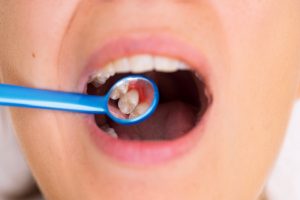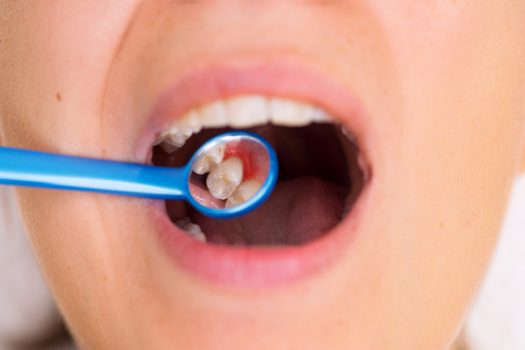Periodontal is composed of two root words- “Perio” and “Dontal.” Perio means around, and dontal means teeth. Thus, going by the name periodontal diseases are the diseases caused by the structures present around the teeth that are the gums, periodontal ligament, and alveolar bone.
The earliest stage of periodontal disease is gingivitis which relates to infection only in the gums. In the later stages, the virus spreads to all the tissues around the teeth.

Causes of periodontal diseases
Our mouths are full of bacteria. When these bacteria combine with mucus and other particles, they form a sticky and colorless plaque on the teeth. To get rid of this plate, the cells of our immune system release certain substances that may inflame and damage the gums, periodontal ligament or alveolar bone.
Other factors that contribute to causing periodontal diseases are:
- Genes: Some people are at more risk than others when it comes to getting periodontal diseases. The reason is the genes.
- Smoking: Smoking increases the risk of periodontal diseases. The more frequently you smoke, and the longer you burn both increases the chance of you having an infection in your periodontal area. If already you have periodontal disease, smoking makes it more severe. It is believed so because smokers collect more tartar on their teeth, often developing deeper periodontal pockets. They are also likely to lose more bones.
- Tobacco use: Use of tobacco has the same effect as smoking. Chewing smoking for more extended times can increase the risk of your diseases more.
- Misaligned or crowded teeth, teeth with braces or bridgework: All these factors make it difficult to brush the teeth and stop the toothbrush from reaching to all points in the mouth, thus enhancing plaque and tartar formation. For this, one can consult the dentist or doctor to find out best ways to clean the teeth.
- Grinding, gritting and clenching the teeth: These factors lead to increase in the severity of the disease. If the gums are already inflamed, these habits put extra force on the teeth and speed up the breakdown of the periodontal bone and ligament.

Other elementary factors can also increase the risk of periodontal diseases like:
- Stress
- Fluctuating hormones
- Medicines like Phenytoin, Cyclosporine, Nifedipine
- Diseases like diabetes, Rheumatoid arthritis, and HIV
- Poor nutrition
Symptoms of infection in the periodontal area
- Red, swollen or tender gums
- Pain in mouth, at one or other area
- Bleeding gums while brushing, flossing or eating hard food
- Gums are receding or pulling away from the teeth, thus causing the teeth to look longer than they initially were.
- Teeth becoming loose or separating
- Formation of pus between gums and teeth
- Sores in the mouth
- Persistent bad breath
- Change in the bite structure or the way the teeth fit together when they bite
- Fitting of the partial dentures may change
Dr. Alex Planes, a Vero Beach Dentist, says that one should surely consult a dentist or periodontist if he/she sees one or more than one symptoms to avoid high damage.
Prevention of periodontal diseases
- Thoroughly brushing the teeth regularly, two times a day. Even one can clean the teeth after every meal which may help remove food debris and plaque trapped between the teeth and the gums.
- Cleaning the tongue and the teeth on a regular basis.
- Floss your teeth at least once a day helps remove the food particles and plaque between the teeth and also along the gums line at places where brush may not reach.
- Swishing with mouthwash can reduce plaque and help to remove the remove the remaining food particles that may be missed by brushing and even flossing.
- Quitting smoking and tobacco can also help in avoiding periodontal diseases. Cutting down the intake of these can reduce the risk of tartar formation.
- Grinding, gritting and clenching of teeth can be avoided by paying attention and avoiding these habits simply.
Getting the disease cured
Treatment may range from personal care to surgery depending on the seriousness of the issue.
- Self-care: Tooth polishing: Tooth can be polished efficiently by using a gritty paste and then rotating brush to remove stains formed on the surface of the teeth.
- Oral Hygiene: Regular oral hygiene may be followed by keeping the mouth clean and regularly brushing the teeth, flossing and also using mouthwash.
Medications
- Topical antiseptics can help to prevent the growth and destroy the microorganisms.
- Other antibiotics can also help to stop the growth of plaque-forming bacteria.
- A medical procedure like the removal of dead, damaged or infected tissue from wounds to promote healing.
Important Article: Gum Diseases Causes And Prevention
Surgical Procedures:
- Gingivectomy
- Gingivoplasty
Having periodontal disease is very common and not something to be worried about if the treatment is carried out in time.
References:
- https://en.wikipedia.org/wiki/Periodontitis
- https://www.colgate.com/en-us/oral-health/conditions/gum-disease/what-is-periodontal-disease
- http://planesdentalarts.com/education/what-is-a-vero-beach-periodontist/

